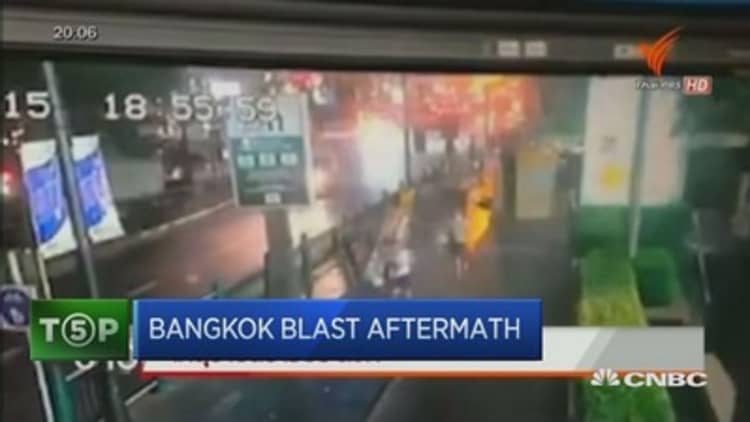
Panic? No. Grief, tension and uncertainty? Yes. Those are my rawest impressions of the mood in the Thai capital a day after Monday's bomb blasts that killed 22 people and injured 123.
Our Tuesday early afternoon flight from Singapore seemed relatively full - the usual mix of Japanese executives, a smattering of families and Thais returning home. Bangkok's Suvarnabhum international airport was certainly less busy but functioning normally with no visible heightened security in the arrivals hall. Bleary-eyed Russians hauled luggage from the lumbering carousel. A tour group of Chinese tourists in matching orange sun hats strode purposefully through customs. All seemed normal, perhaps a little less less chaotic.
I looked up a U.S. lawyer friend of mine based in Bangkok to get a sense of the mood.
"I don't sense any fear," he told me. "I sense sadness. Sadness for the country. The question is who (carried out the attack) and why." Yes, there are concerns 'Brand Thailand' gets tarnished, but Bangkok, he said, is "certainly not Baghdad or Damascus."
Overnight local time, Thai authorities said they were continuing the search for a suspect seen on closed circuit television footage near the Erawan shrine where the pipe-bomb exploded.
Read More Bangkok bombing exposes frailty of Thai economy
The grainy CCTV footage shows a young man entering the shrine compound wearing a backpack, sitting down against a railing and then slipping out of the bag's straps. Wearing a yellow shirt and with shaggy, dark hair, the man then stands up and walks out holding a blue plastic bag and what appears to be a mobile phone. The backpack was left by the fence as tourists milled about.
Authorities also said they had not established a link between the large bomb on Monday night and a smaller explosive that was thrown from a river pier in Bangkok on Tuesday, further jangling nerves in the capital.
But amid the uncertainty, for resilient Thais life goes on as it did during the numerous coups that have dotted the country's political landscape over the past decade. That said, people here expect a security crackdown. What form it takes and exactly how the military government responds will be critical.
Monday's attack was a shock to the system. The Thai stock market fell as much as 3 percent and the currency sank to new six-year lows. Bangkok's well-heeled spenders have abandoned the high-end shopping malls near the site of the bomb blast and one hotel manager told me about a wave of cancellations.
Clearly, many are thinking twice before visiting Bangkok. Others are less risk-averse. A group of Finnish businessmen seemed more concerned about finding a restaurant than planning their exit strategy when I questioned then about how safe they felt.
Without a doubt, this attack comes at a tough time for the embattled Thai economy. Domestic consumption was already sluggish due to high levels of household debt. The export-led economy was already feeling the heat from the China slowdown, Fed normalization and the stronger dollar. Beijing's devaluation of the yuan only added more pressure.
Tourism was something of a bright spot. Tourist arrivals in July rose nearly 40 percent from last year as the industry bounced back from a sharp fall in 2014 during months of street protests and a military coup.
An interim parliament hand-picked by a junta that seized power last year is due to vote on a draft constitution next month. Critics say the draft is undemocratic and intended to help the military secure power and limit the influence of elected politicians.
But the bombing has put that budding recovery more immediately in question.
Read More Bangkok reels after deadly shrine bombing
Thai watchers said Monday's bomb blasts - if they do spell heightened and prolonged instability - could deliver a jolt to the Thai economy that's already teetering on the edge. As one regional economist put it, the incident is "very bad news if this marks the beginning of violence."
Police said overnight that they are keeping an open mind as to who might be responsible for the blast.
"Police are not ruling out anything including (Thai) politics and the conflict of ethnic Uighurs who, before this, Thailand sent back to China," National Police Chief Somyot Pumpanmuang said. Thailand forcibly returned 109 Uighurs to China last month.
Though it's unclear just how badly the Thai economy will be impacted, Bangkok-based Paul Gambles, managing director of MBMG Group, said there's "no margin for error in the Thai economy."
Thailand, known in the tourist brochures as 'the land of smiles', is wearing a deep frown. These are testing times for the nation.
- Reuters contributed to this report.


